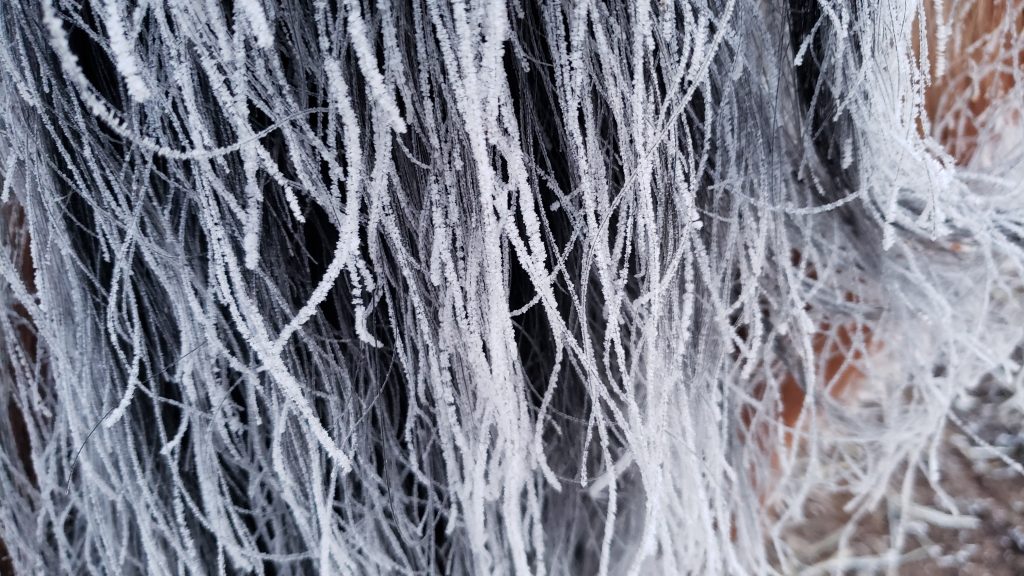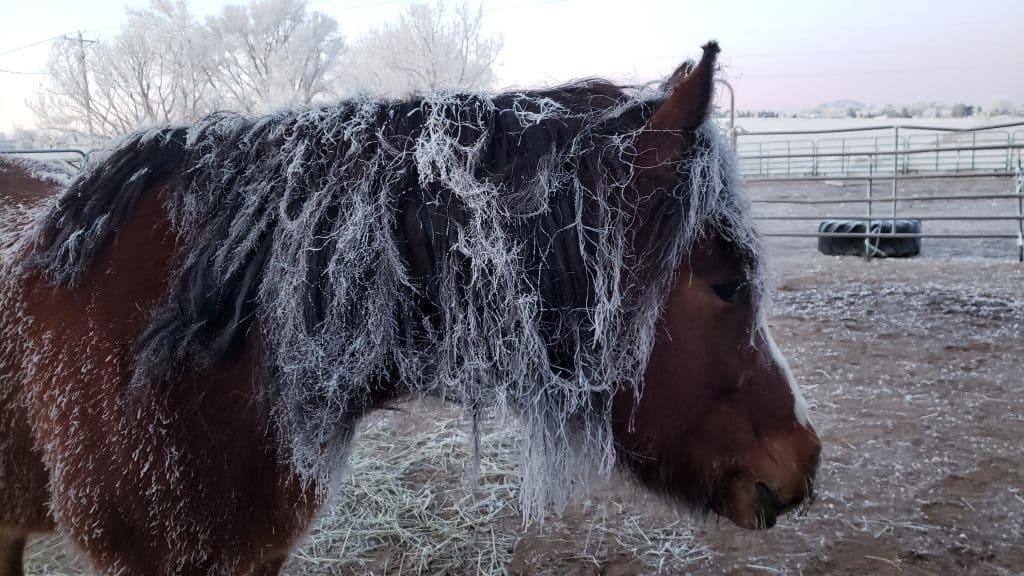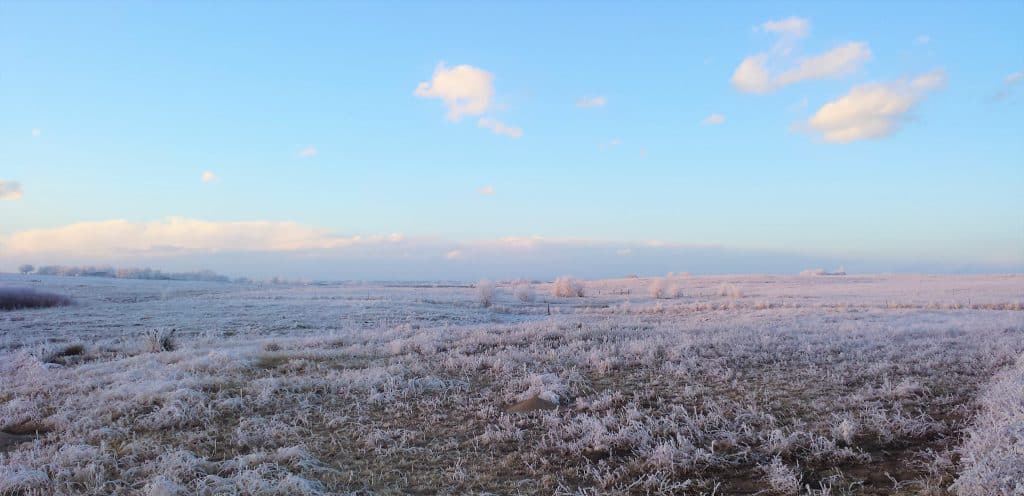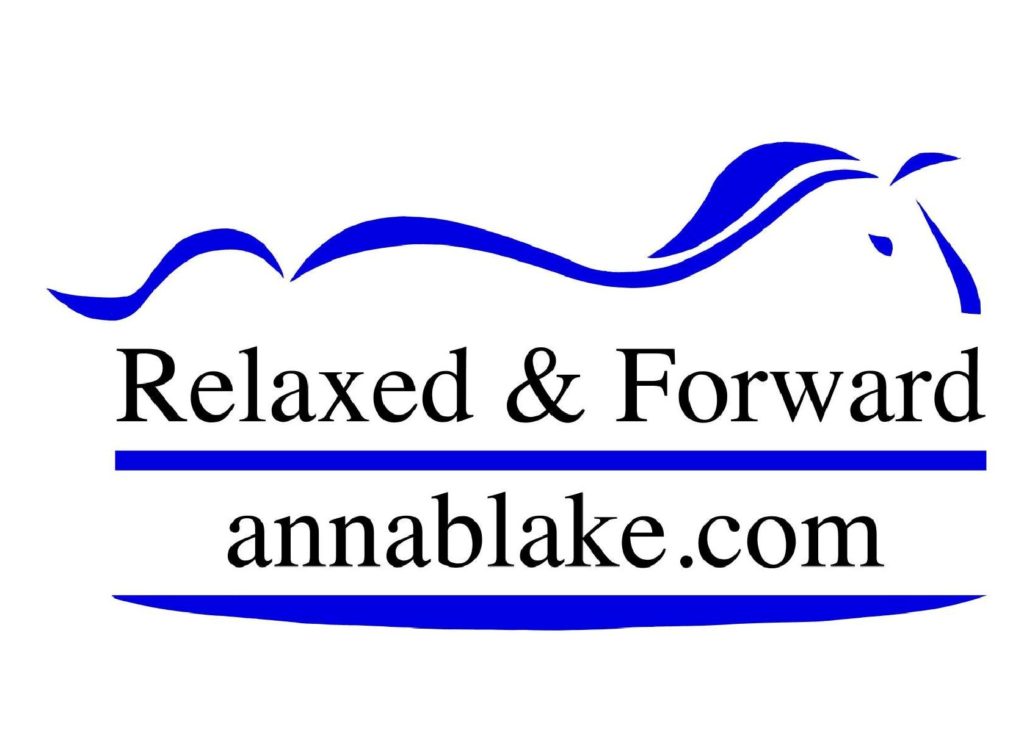
The night-feed is my favorite. In the summer, the sky and clouds are as gaudy as the underwear department at the dollar store. If they have an underwear department, which I’m a little proud that I don’t know. The light loiters over the pond, as my farm exhales the day and rolls it to rest with slow deliberation. Winter is different, the sun drops with a thump like a barn door slamming, and instantly, it’s something beyond black. No color, just star specks, a lonely moon, and dark from your toes to the heavens. I walk in the pasture with the ghost herd sometimes, away from house lights, feeling the earth through my boots. Not tonight. It’s well below freezing and there’s a coat of ice on each tiny agate of gravel and a hoar frost so thick that I worry, in this drought, it’s as close to snow as we’ll see.
It’s nine o’clock as I head out to feed, boots tight with socks, jacket so thick it brushes the door jams, two hats, and my headlamp on top. The dogs go with me to the backdoor and reconsider, retreating to the space heater under my desk. When Edgar Rice Burro sees me on the back porch, he lifts his muzzle and hurls a throaty exhale at me. He used to bray anytime he saw me but we’re old coots now. All I get is a series of breathy moans to hurry me up.
The battery in my headlamp has been failing. I’m not boring you, am I? It turns on but then goes dim at a snail’s pace, so by the time I’m behind the barn, it’s faded to worthless. Then the next night, the light barely flickers on but I’m belligerently frugal, so off I go thinking I can squeeze one more night-feed out of the battery. I surrender. I’ve got fresh batteries and it’s searchlight-bright. So intense that when I look at the horses they act a bit guilty. Not colicky, just ready to confess. I’m shuffling hay-bags out, I fall less when I shuffle. There’s a tight line of light, a crisp oval of vision on the ground just in front of my toes. That’s when it comes to me. An analogy!
Let’s say you have a problem with your horse. It’s easily identifiable. Your horse won’t go forward, your horse won’t pick up his feet, your horse is afraid of something stupid. Your horse does something he knows better than doing and you set about correcting the problem. Your first three ideas don’t work and he seems to be getting worse. Everyone’s anxiety is growing.
But most problems, not all, but most times, is that we’re hyper-focused on one small bit of unruly behavior, like a headlamp on glare ice. It’s a small spot just big enough to take a stand. It’s also a good time to make a choice about drama.
Instead, you mention your training problem on social media, carefully describing the fault in less than two or three sentences. The railbirds’ tail feathers all catch fire, each one with an infallible but contradictory training technique. Let’s define railbird: It’s a person who has good intentions and would like to help. Sometimes their word choice is not the best, but you’ll never fault us for a lack of passion for horses.
Sometimes a lone railbird asks if you’ve had your vet check your horse, a great idea, but others are so busy sharing their training successes that the idea of pain is boring. But the idea sticks in your mind, knowing it might take years to diagnose, much less solve, a health problem. Pretty please, anything but that. Still, the most common reason that horses change their behavior is in reaction to pain. Training techniques don’t heal pain but they can destroy trust.
Do you notice that professional trainers don’t respond with a comment? You can’t see us wince in silence either. It isn’t that we’re money-grubbing monsters. Most of us spend unpaid hours working with troubled horses who have been inadvertently punished for speaking up about pain. We also know that a real problem can’t be fixed in a comment box on social media.

Take an unemotional step back. If one step doesn’t cool you off, take more. Start by noticing your own tunnel vision. So much of working with animals is CSI (crime scene investigator) work. Cue the theme music and let the search begin. Focus less on the troubling behavior and more on your horse’s individual situation. Remember those long-winded intake questionnaires you’ve filled out in waiting rooms. Is the horse new to you? Has the herd changed? Have you been feeding differently? Is it time to have his teeth checked? Could he be footsore or perhaps strained some muscles playing with the other frat boys in the gelding pen? Could your mare be struggling with an ovarian cyst, one of the most commonly underdiagnosed health conditions? Is your good horse getting older now, and as much as you don’t want to hear, is he letting you know? This is only the start but the questions are no fun to ask, are they?
If you have a stoic horse, you might think you’ve trained him back to behaving, when the truth is you’ve trained him to not tell you when it hurts. It might seem to work for a while. The best way to develop chronic lameness is to miss slight imbalances and work horses while they are sore. If your answer is, “Things are the same way they’ve always been,” sorry, not so much. All horses change over time and each stage has new challenges. Good ownership means constantly looking for ways to do better. The best guarantee against training issues isn’t by training at all. It’s supporting the horse’s domestic life. Does he have friends to socialize with and room to kick up his heels? Does he get fed in a way that mimics grazing?
Maybe it’s an honest misunderstanding. The rider says her horse won’t go forward and I ask if the horse shows signs of lameness. The rider says no but not going forward is a sign of lameness. It’s also a sign of poor saddle fit, unbalanced riding habits, and a few dozen other things. Cheer up. Your horse has to react to let you know the things you don’t want to hear.
Now pull your vision back even farther. Your horse, whose senses are so much better than yours that you think he has psychic powers, hears and smells and feels things at a more subtle level than our dull senses puck up. If we even used our senses, which we don’t. How long will we blame horses for the fact that we’ve lost touch with the physical world? Wouldn’t we be smarter to let them take us back to a time when we felt something wild in the wind?

This is your annual warning that Spring is just around the corner. Llamas are the early warning system on my farm. Both are ancient and don’t like each other much, but they are being uncharacteristically wacky, even for llamas. Soon our horses will do the same, a sure sign of spring, as well as a plethora of potential ailments. The air is crisp, coyotes are mating, and down under the frost, grasses worming their way to the surface. Things will come apart for a couple of weeks.
Be patient; we’re all a year older. It isn’t a problem. It’s a celebration.
…
Anna Blake, Relaxed & Forward, now scheduling 2022 clinics and barn visits. Information here.
Want more? Become a “Barnie.” Subscribe to our online training group with training videos, interactive sharing, audio blogs, live chats with Anna, and join the most supportive group of like-minded horsepeople anywhere.
Anna teaches ongoing courses like Calming Signals, Affirmative Training, and more at The Barn School, as well as virtual clinics and our infamous Happy Hour. Everyone’s welcome.
Visit annablake.com to find archived blogs, purchase signed books, schedule a live consultation, subscribe for email delivery of this blog, or ask a question about the art and science of working with horses.
Affirmative training is the fine art of saying yes.

This encapsulates the most significant change I’ve made as a result of being with horses: to “zoom out” to a wider view of all the variables that affect the horse, and to realize that it’s rarely one thing standing by itself. Therefore, “fixing” the problem will not be fast, necessarily, and it won’t be simple. This awareness has led me to respond to human problems differently as well.
You’ve come so far since we met. Thanks, Susan.
I must say thank YOU for facilitating a lot of that progress (and the horses, of course!)
I agree – “fixing” any problem to do with our bodies – or our horses, dogs, cats bodies – is rarely just one thing. Getting older – whether its us (humans) or our animals, is changing – period. I see that in myself (and HATE it) and have seen it too many times with my animals – all species. Since we humans are the only ones that are aware of age related disabilities (crap, in other words) our animals deserve us to be aware of theirs – its hard – watching them get older being “aware”.
But yeah, Anna, I agree – another year older IS a celebration.
Is that the good news and the bad news for all of us. Thanks, Maggie
Another wonderful essay, Anna.
I love how the first three paragraphs almost read like a poem.
As always, thank you.
BTW, I just recommended your memoir, “Stable Relation”, to a group I follow called Keystone Equine.
Sometimes we just don’t want to or can’t see what it is, but you know even if you don’t want to know or don’t yet know, but when you know it’s both better and worse and yes, worthy of celebration. This essay is most beautiful, Anna, dollar store underwear and all. I confess, like horses in the headlamp, that I celebrate the fact that hoar frost and snowdrifts are, for the most part, a thing of my past.
Hehehe. It’s funny but I also know you’ve had a rough year of what you eventually had to know. Sorry for that, my friend.
I grew myself a bigger horse heart in the process, so at least there’s that. Thanks, Anna.
yup, In my experience, that’s how it happens.
This is so powerful Anna…
And timely as today I’m a year older
Oh wait, it’s tonight at 12:01 I get a year older …
Close enough. Here’s to another year and complaining about the weather. Happy Cake Day, Ellen.
I’m spending the cold months learning to do some basic body work. It’s opened another door on a plethora of things that could be/need to be better for my three mares.
They say thank you.
Anna, being a duct tape, popsicle stick, and string kind of gal, I was happy to hear the label “belligerently frugal”. It sounds so much nicer than cheap which I don’t consider myself. I simply want to get the very last functional moment from my inanimate objects. THANKFULLY, I don’t have the same approach with living things. I have a much wider lens when trouble rears it’s head with my charges, but I must admit it’s a hard path to travel. I absolutely hate to see suffering; it’s a bit puzzling as to why I chose nursing as a vocation, and collected “rescued” horses, dogs, cats, and goats throughout my life. I think my heart grew bigger still today, reading your blog. Thank you!
What if the biggest heart wins? I hope so. Thanks Laurie.
So good, clear, thoughtful and well expressed—as usual. Thank you—as usual. And very happy you put that new battery in.
Thanks, Carol.
Pretty much what I know about horses is how to build a barn, build and set up the stalls, pipe the waterers, install the flooring, etc. I’m a builder, but I really think I get sincere appreciation from the occupants when I fix chewed up wood planks and adjust the waterers water flow. I have occasional conversations with the guys and they know I eat a lot of apples so they warm up to me right away: bribery is not required, I think they just like a simple guy not telling them what to do. The bottom line here is that I subscribed to your blog about two years ago and really look forward to the read.
You take a city boy like me out to the farm and I’ll choose your blog anytime!
Thanks for all you do!
Hello, Will. You might be a city boy but you read horses pretty well. Sometimes it’s what we don’t do. Thanks for following along.
All very good, Anna. .. and I especially like the ” How long will we blame horses for our losing touch with the natural world?Wouldn’t we be smarter to let them take us back to a time when we felt something wild in the wind?”
We really do have a tendency to get overly focused on a problem. A compelling essay, as always.
Thanks, Sarah. Feels good to be making the right thing a bigger target.
The seasons are real indeed! For me the enhanced light in winter from the snow reflecting any celestial light is always amazing. It doesn’t make -30C feel any better at 11pm for last call at the barn but it does have a magic. I have struggled a lot with my horses over my lifetime- according to my co-workers, I am an old timer. Thankfully a bit of wisdom is catching up with experience so there are 2 times of year for me when the horses are more challenging. The spring has always been a given, a frustrating given in the past, now accepted and given a shrug instead of stomping my feet!
The other ‘season’ has nothing to do with climate. It is late fall, still possibly good riding time without bugs and heat to deal with but the horses sense something else. It took me a while to allow myself to voice this opinion so here it is. It is hunting season. It may just be the rutting season, but if you were to ‘ask’ horses – it is later. It is possible for the horses, I believe , to smell, feel, sense, whatever is in the ethers of the deer on the move from fear. Deer populate the area and are familiar with the threat of a different death, if they live beyond a few years. It’s not that the horses see more deer at this time but I think they give off a tonne of pheromones of high alert.
So I give my horses a month of no away from the herd time, no worrisome new experience, no let’s learn a new challenging task. Near the end of that month, I see them coming to me more for attention, questioning, maybe informing me that they are ready to get back at doing things together.
It has made my time with them more peaceful.
Thanks, Rosemarie. Great comment. I think that connection with deer is real as well.
I agree, Anna – deer & horses being prey animals – there does seem to be a connection.
This post neatly outlines the last 90 days of my horse(wo)manship adventure. It’s always comforting to remember
we’re all in a similar boat, navigating the best we can. ❤️
Also – a headlamp-related treat for summertime: When you look down at the ground in the pitch dark and see (an alarming amount) of prismatic sparkles in the searchlight oval – it’s SPIDER EYES!!!
And possibly more shocking than dollar store underwear — dollar store pregnancy tests lol…
I should thank you for commenting, and glad it working now. But. Spider. Eyes.
(I made up the dollar store underwear, but the pregnancy tests should be readily available???)
Oh yes – no issue with availability – just questioning accuracy for a $1 price tag 😬
gak.
“I’ll be your friend.” This is Big Gull’s legacy. Many years ago, a foal entered our field through a breach in the fence. When one of our horses tried to menace him, Gulliver planted himself between them, protecting that foal until he could be returned to his mother.
And in the years since, Gulliver offered his “friendship” to the horses who were rebuffed by the alphas of the herd.
I call him Gully Son.
Nothing much to do with today’s excellent essay, Anna, but I wanted to share my grief on the loss yesterday of my horse, Gulliver. He came to us in 2000 when he was three years old. An 18+h TB, he spent most of his life as a “lawn ornament.” Though there were many fun moments with Gully and I accepted and loved him for who he was, he wasn’t one of those “sweethearts” everyone writes about once a dear one passes on. He was uncomfortable from foot issues a lot, but he always ate, drank and pooped, so I saw no reason to deny him his life. Run free, Gully Son.
Thank you for letting me share this tribute to my big guy.
No one has ever been able to measure the heart of a TB, and Gulliver is all that. Reading this makes me think that he was the true herd leader… Lynell, thank you for keeping him safe from those who would menace him. A life well-lived, both of you. Sorry for your loss.
So sorry, Lynell – doesnt matter whether he was a sweetheart or not – in your heart he was sweet. Just leaves an empty spot, doesnt it?
Mag